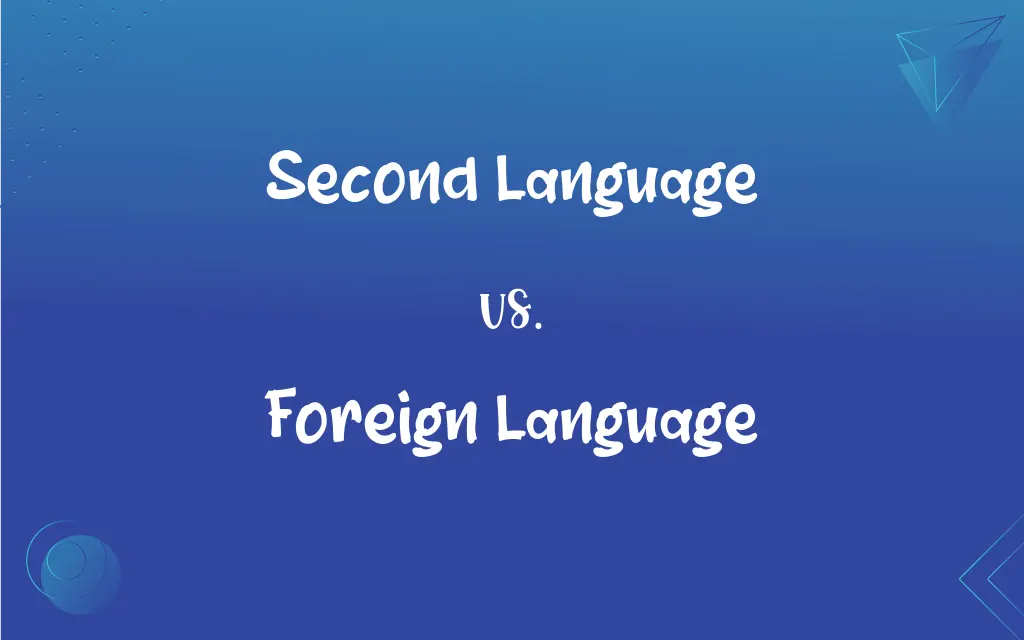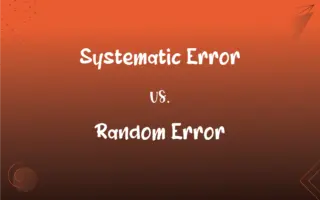Second Language vs. Foreign Language: What's the Difference?
Edited by Aimie Carlson || By Janet White || Published on December 4, 2023
A second language is learned and used within the context of the speaker's society, often for practical use, whereas a foreign language is studied and used outside its native cultural environment, typically for education or interest.

Key Differences
A second language is typically acquired in a setting where it is spoken by the community, making it a practical necessity or part of daily communication. A foreign language is learned in a context where it is not the community's dominant language and is often not essential for everyday communication.
Learning a second language often happens through immersion and daily use, giving learners a functional command of the language. In contrast, learning a foreign language usually involves structured education and formal learning environments, like classrooms.
The proficiency in a second language is often higher due to its practical use in daily life. For foreign languages, proficiency can vary widely depending on the learner's exposure and the learning environment's effectiveness.
A second language can influence a person's cultural and social identity, integrating them into a new linguistic community. Foreign languages are often learned for specific purposes, such as travel, business, or cultural interest, without significantly altering one's social identity.
The acquisition of a second language is often driven by necessity or societal integration, whereas learning a foreign language is frequently motivated by personal interest, academic requirements, or professional needs.
ADVERTISEMENT
Comparison Chart
Learning Environment
Acquired in a community where it is commonly spoken
Learned in a setting where it is not dominant
Purpose of Learning
For practical use and daily communication
Often for education, interest, or travel
Level of Proficiency
Generally higher due to daily use
Varies, often lower without immersion
Cultural Integration
Can influence social and cultural identity
Usually learned without cultural immersion
Primary Motivation
Necessity or societal integration
Personal interest or academic/professional needs
ADVERTISEMENT
Second Language and Foreign Language Definitions
Second Language
Often acquired through immersion and daily communication.
She quickly learned English as her second language in the U.S.
Foreign Language
Often learned in structured settings like classrooms.
I'm taking Italian as a foreign language for my degree.
Second Language
Can influence the learner's cultural and social identity.
Learning Mandarin as a second language connected me to Chinese culture.
Foreign Language
Not essential for daily communication in the learner's community.
Russian is a foreign language to me; I learn it for fun.
Second Language
A language learned and used in a community where it is spoken.
Spanish became his second language after moving to Spain.
Foreign Language
A language studied outside its native cultural environment.
She studied Japanese as a foreign language in college.
Second Language
Typically acquired out of necessity or societal integration.
He picked up German as a second language while living in Berlin.
Foreign Language
Learned for specific purposes such as travel or interest.
He's learning Arabic as a foreign language for his trip to Egypt.
Second Language
A language used for practical necessities in everyday life.
French is my second language; I use it at work every day.
Foreign Language
Proficiency can vary without immersion in the language.
My proficiency in Spanish as a foreign language is intermediate.
FAQs
Is a second language always learned in childhood?
No, a second language can be learned at any age.
How is a foreign language different?
A foreign language is learned outside its native cultural environment.
What is a second language?
A second language is one learned and used within a speaker's community.
Can a foreign language become a second language?
Yes, if a speaker moves to a community where the foreign language is dominant.
Do second languages influence identity?
Yes, they often play a significant role in cultural and social identity.
Can learning a foreign language lead to fluency?
Yes, but it often requires extensive study and practice.
Are second languages taught in schools?
In multilingual communities, yes; otherwise, they're often learned informally.
Are foreign language classes available online?
Yes, there are many online platforms for learning foreign languages.
Is immersion important in learning a second language?
Yes, immersion is a key factor in effectively learning a second language.
Does learning a second language require a formal education?
Not necessarily, it can be learned through everyday use and interaction.
Is speaking the only way to learn a second language?
Speaking, along with listening, reading, and writing, is important.
Is a second language always the second one learned?
Not always; it refers to any non-native language used regularly.
Do diplomats need to learn foreign languages?
Yes, diplomats often learn foreign languages for international work.
Why do people learn foreign languages?
For education, travel, interest, or professional reasons.
Can movies and music help in learning a foreign language?
Yes, they can be useful tools for immersion and understanding.
Is it easier to learn a second language in a native environment?
Generally, yes, due to regular use and immersion.
Can a second language affect thinking patterns?
Yes, it can influence cognitive processes and perspectives.
Do foreign languages require special learning materials?
Often, they require textbooks, software, or other educational resources.
Are foreign languages always taught in formal settings?
Mostly, but self-study and informal learning methods are also common.
Are second languages used daily?
In many cases, yes, especially in multilingual societies.
About Author
Written by
Janet WhiteJanet White has been an esteemed writer and blogger for Difference Wiki. Holding a Master's degree in Science and Medical Journalism from the prestigious Boston University, she has consistently demonstrated her expertise and passion for her field. When she's not immersed in her work, Janet relishes her time exercising, delving into a good book, and cherishing moments with friends and family.
Edited by
Aimie CarlsonAimie Carlson, holding a master's degree in English literature, is a fervent English language enthusiast. She lends her writing talents to Difference Wiki, a prominent website that specializes in comparisons, offering readers insightful analyses that both captivate and inform.

































































